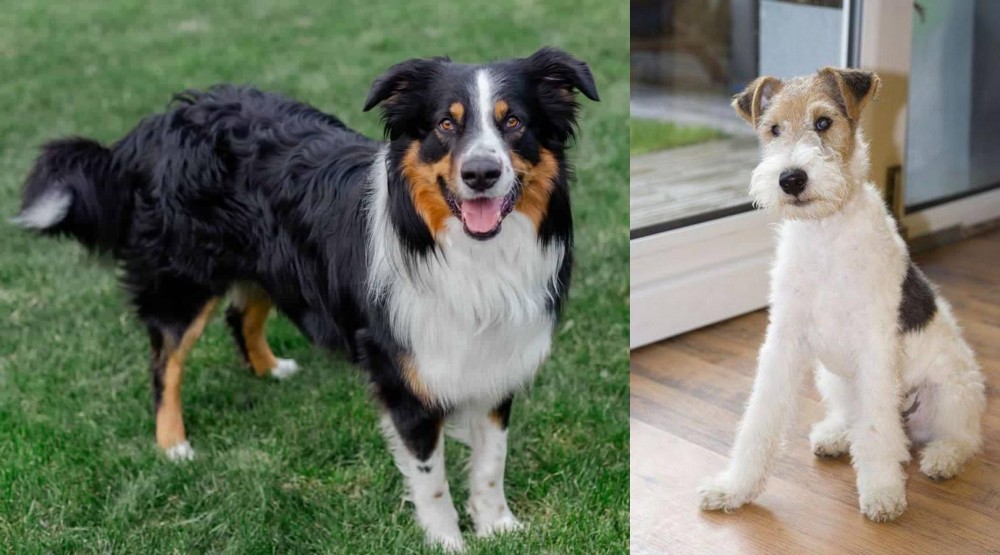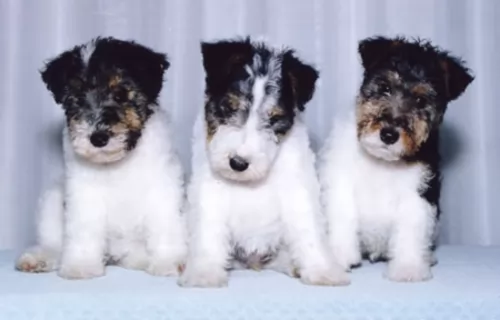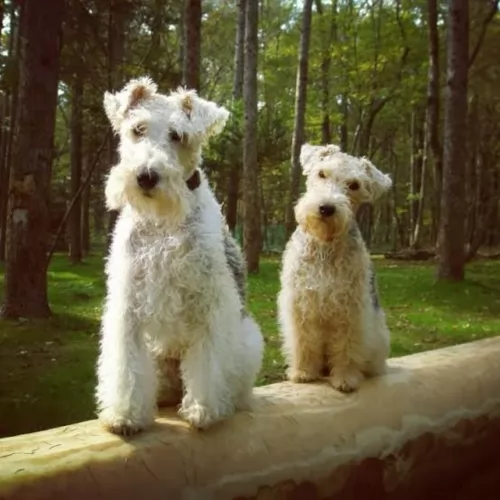 Petzlover
Petzlover English Shepherd is originated from United States but Wire Fox Terrier is originated from United Kingdom. English Shepherd may grow 19 cm / 8 inches higher than Wire Fox Terrier. English Shepherd may weigh 19 kg / 42 pounds more than Wire Fox Terrier. Both English Shepherd and Wire Fox Terrier has almost same life span. Both English Shepherd and Wire Fox Terrier has almost same litter size. English Shepherd requires Low Maintenance. But Wire Fox Terrier requires Moderate Maintenance
English Shepherd is originated from United States but Wire Fox Terrier is originated from United Kingdom. English Shepherd may grow 19 cm / 8 inches higher than Wire Fox Terrier. English Shepherd may weigh 19 kg / 42 pounds more than Wire Fox Terrier. Both English Shepherd and Wire Fox Terrier has almost same life span. Both English Shepherd and Wire Fox Terrier has almost same litter size. English Shepherd requires Low Maintenance. But Wire Fox Terrier requires Moderate Maintenance
 The English Shepherd is another dog with an English name that was developed in the United States. They developed from British farm dogs that were brought to the United States in the 17th, 18th and 19th centuries by the Scottish and English as they settled in the New World. Tracing their line through working dogs and collies in Scotland and northern England, the settlers bred them with local dogs and each other. These working farm dogs were called English Shepherds, Scotch Collies, barnyard collie, farm shepherd, the cow dog, and the old fashioned shepherd.
The English Shepherd is another dog with an English name that was developed in the United States. They developed from British farm dogs that were brought to the United States in the 17th, 18th and 19th centuries by the Scottish and English as they settled in the New World. Tracing their line through working dogs and collies in Scotland and northern England, the settlers bred them with local dogs and each other. These working farm dogs were called English Shepherds, Scotch Collies, barnyard collie, farm shepherd, the cow dog, and the old fashioned shepherd.
The English Shepherd was appreciated by the settlers and farmers because he was a versatile dog that could herd their flocks and protect their homes as well. They appreciated his intelligence and ability to hunt vermin and be a companion for their children. English Shepherds were bred to work with a variety of livestock such as pigs, cattle, goats, sheep and fowl. They were used to hunt as well and were known to track racoons and squirrels and tree them. There wasn’t a more popular dog in the American Midwest and East in the 1800’s and 1900’s.
The breed is trustworthy, alert and independent. As the small family farms were replaced by large agricultural enterprises the English Shepherd’s numbers dwindled as well until he fell into the category of a rare breed. There were no clubs to support it and not AKC recognition. The UKC had a different dog registered as a farm shepherd.
Today’s English Shepherd is still a farm dog, but he also hunts, is a therapy dog, competes in AKC trials, and performs search and rescue duties. As a farm dog, they are still the most desirable due to their versatility in working with different livestock, guarding the home and caring for the children. They do these things in a gentle way if possible but can be tough if needed. They have great empathy for the livestock and for their human family. This makes him a great dog for the family. The English Shepherd has remained a farm dog, working dog more than a show dog, over all these years.
 The wire fox terrier was developed in England by fox hunting enthusiasts. They wanted a feisty dog that could chase foxes down their burrows.
The wire fox terrier was developed in England by fox hunting enthusiasts. They wanted a feisty dog that could chase foxes down their burrows.
It is thought that the dog descended from the rough-coated black and tan working terriers of Wales.
The dog wasn’t popular as a pet until the 1930s when its appearance in certain films gave it a popularity-boost.
 The American bred English Shepherd is a medium sized dog that looks somewhat like an Australian Shepherd or Border Collie. They have tails, never come in merle coloring and their head is not as rounded as the Australian Shepherd. A working dog, its proportionally very well balanced. Because the English Shepherd is so popular across the country, doing a wide variety of jobs, there is some regional differences in the dogs.
The American bred English Shepherd is a medium sized dog that looks somewhat like an Australian Shepherd or Border Collie. They have tails, never come in merle coloring and their head is not as rounded as the Australian Shepherd. A working dog, its proportionally very well balanced. Because the English Shepherd is so popular across the country, doing a wide variety of jobs, there is some regional differences in the dogs.
The coat can be curly or straight with feathering around the tail, ears and legs. Their heads are slightly rounded but broad and the muzzle is also broad with a solid black nose except for the clear sable dogs whose nose is brown. The eyes show you how intelligent and strong this breed is, and they should be round, brown and oblique. The ears are close to the head and wide apart.
With a strong, muscular back and shoulders the English Shepherd can do almost anything you ask him to. His legs are strong and straight, and his hind legs are muscular. His feet are compact, oval and well padded.
 The Wire Fox Terrier is a sturdy, medium-sized dog that weighs between 7 and 9kg and stands between 35 and 39cm at the withers.
The Wire Fox Terrier is a sturdy, medium-sized dog that weighs between 7 and 9kg and stands between 35 and 39cm at the withers.
The dog’s double coat is essentially white with brown or tan markings and can be medium length and wiry, tending to be curly too.
He is a light shedder. The face is long, without much shape and eyes appear to be fairly close together. The ears are fairly small and they fold forward toward the cheeks. The tail is docked and is held high.
This really is an intelligent dog and can’t tolerate being bored. It’s essentially a companion dog too and doesn't want to be separated from his owners for too long.
As a companion dog he is going to want a lot of attention. They’re independent and strong-willed and will benefit from training and socialization.
They are great around children but they do need to be supervised as they are inclined to nip, especially when highly excited. They also bark quite a bit and the owner might have to do something to stop this yapping, especially when the dog is bored.
 It may seem strange to talk about kindness in a working dog, but it is one of the defining traits of the English Shepherd, along with intelligence. The breed is extremely kind to everyone he lives with animals and people. Once he is secure in his job and takes in his children or his herd, he is one of the best caretakers around. He is an independent thinker, is easily trained, and highly affectionate. However, he does see himself as the boss and unless you establish yourself in that alpha role you could have problems.
It may seem strange to talk about kindness in a working dog, but it is one of the defining traits of the English Shepherd, along with intelligence. The breed is extremely kind to everyone he lives with animals and people. Once he is secure in his job and takes in his children or his herd, he is one of the best caretakers around. He is an independent thinker, is easily trained, and highly affectionate. However, he does see himself as the boss and unless you establish yourself in that alpha role you could have problems.
 The Wire Fox Terrier is such a canine friend, ready to be with you no matter what you’re doing. They are social dogs and love being involved with their human companions.
The Wire Fox Terrier is such a canine friend, ready to be with you no matter what you’re doing. They are social dogs and love being involved with their human companions.
He is independent but still social and enthusiastic and you can describe him as the ideal family dog.
He is a bundle of energy, and when you bring him into your home, you’re going to get a family member who is playful, joyful, loving and loyal – your very best friend.
 Like many other herding breeds, it has been found that about 15% of English Shepherds had a gene mutation called MDR1. This means they have adverse reaction and high sensitivity to many common drugs for dogs. This condition could be life-threatening so test your dog for it and know what you are up against.
Like many other herding breeds, it has been found that about 15% of English Shepherds had a gene mutation called MDR1. This means they have adverse reaction and high sensitivity to many common drugs for dogs. This condition could be life-threatening so test your dog for it and know what you are up against.
 These are healthy dogs, and if you get your dog from a responsible breeder, he will have been checked for health conditions such as cataracts, hip dysplasia, and luxating patellas.
These are healthy dogs, and if you get your dog from a responsible breeder, he will have been checked for health conditions such as cataracts, hip dysplasia, and luxating patellas.
Cataracts are a problem with the lens of the eye. The lens focuses light and it should be crystal clear. A cataract obscures vision. Sometimes the cataract can be very small but other times it can grow to the size of the lens and then it can cause blindness.
Most times, dogs with cataracts can still see, and even though a dog may experience some confusion with a cataract, they don’t hurt the dog. They don’t go away on their own and will need to be removed surgically. If you see your dog has a cataract, consult your vet to get their opinion on the matter.
Your dog may be licking and scratching a lot and it may just be that your dog has a frustrating and irritating skin problem. This itching isn’t a disease but rather a cause of some disease.
There could be so many things that are causing your pet to scratch and it could be a skin disease, parasites or allergies. It can be terrible seeing the frustration it causes your pet and he will certainly need to see the vet.
 Remember the English Shepherd is a hard working dog. But if you don’t work him don’t overfeed him. Twice a day, he needs about one half cup of a good quality dry food made with an active, medium sized dog in mind.
Remember the English Shepherd is a hard working dog. But if you don’t work him don’t overfeed him. Twice a day, he needs about one half cup of a good quality dry food made with an active, medium sized dog in mind.
In addition to the health concern listed above, the English Shepherd is also prone to:
Both elbow and hip dysplasia can plaque the English Shepherd as it does almost any active breed. Have your puppy tested as it can cause lameness and arthritis.
This is a herding breed and they need exercise. They need a job. They are intelligent and work oriented so make sure they have something to do. Take them to herding trails and have their herding instinct tested. Put them to work in flyball, agility, frisbee, tracking, obedience, rally, herding and showmanship events. Just make sure your English Shepherd has enough to keep his mind and body stimulated at a high rate every day.
 This dog will need to be brushed regularly. Some people hand-strip their dogs. Most people prefer just to take their pets to a professional groomer to have them professionally clipped. The groomers will simultaneously clip his nails, clean the inside of his ears and also clean his teeth.
This dog will need to be brushed regularly. Some people hand-strip their dogs. Most people prefer just to take their pets to a professional groomer to have them professionally clipped. The groomers will simultaneously clip his nails, clean the inside of his ears and also clean his teeth.
The Wire Fox Terrier will expect you to supply him with high-quality dog food if you opt to use commercially manufactured dog food. These foods can be wonderfully convenient but you want the food to be packed with natural ingredients and be high in vitamins and minerals.
Any diet should also be appropriate to the dog’s age, his size, and his activity levels. Some homemade foods can also be a treat but this needs to be simple with no heavy spicing. Things such as boiled chicken, brown rice and vegetables can be an excellent choice.